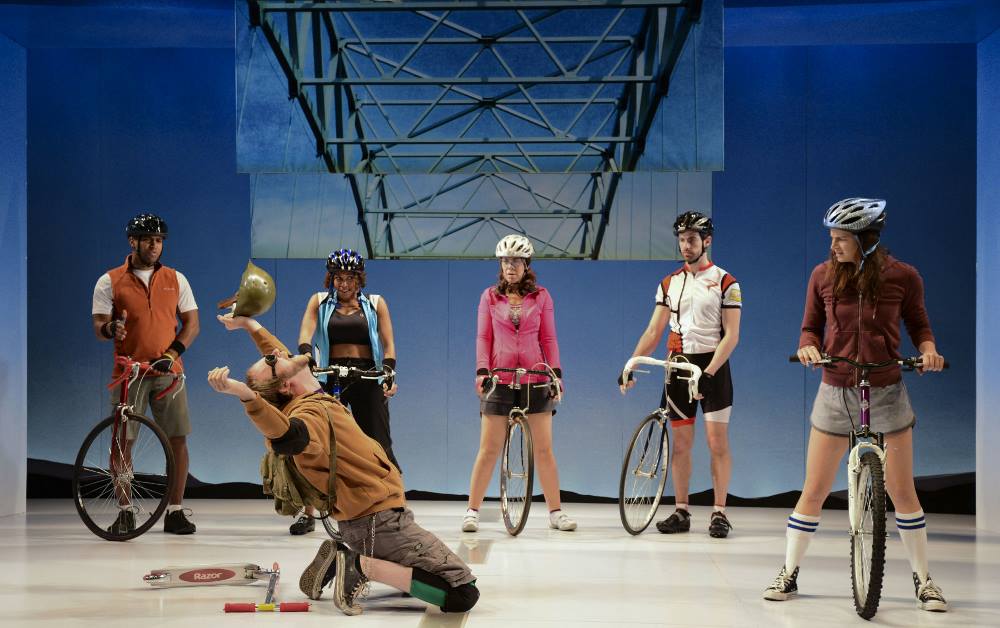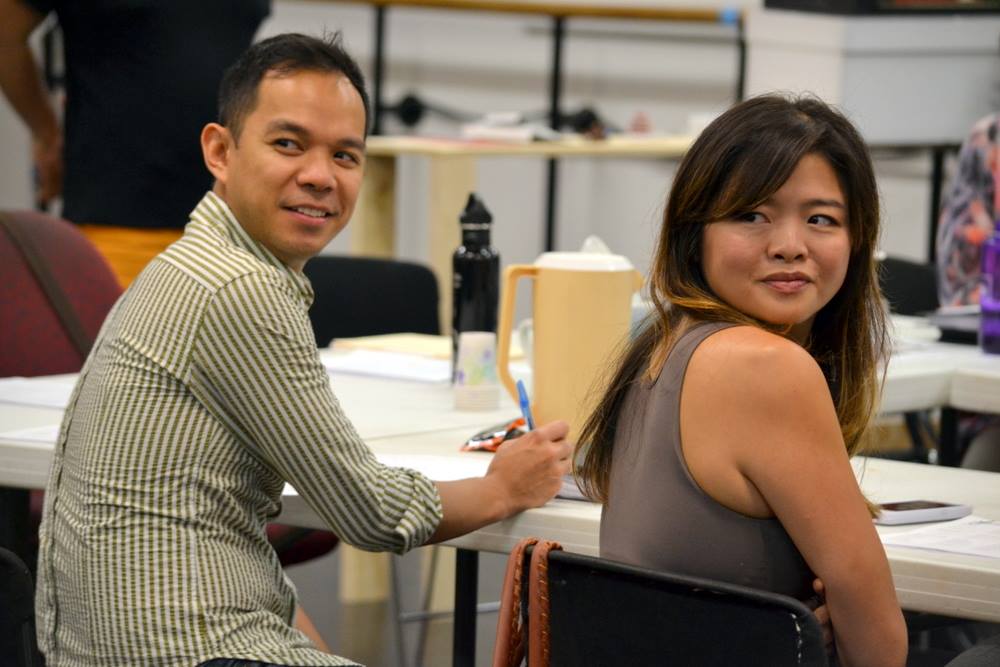ATLANTA: Playwright Mike Lew and director Moritz von Stuelpnagel have more in common than names that are often mispronounced. When the two met 12 years ago as interns at Playwrights Horizons in New York City, they discovered they shared a sense of humor.
“[Mike’s work] shares with me a great mix of high-brow and low-brow,” says von Stuelpnagel, recently nominated for a Tony for directing Hand to God. “Some of the humor is incredibly stupid—disarmingly so—and yet he offers a provocative point of view that’s really jolting.”
The two have worked together in numerous capacities over the years, including on readings and productions of Lew’s Bike America at the Alliance Theatre and Ma-Yi Theatre in 2013. This month, they reteam to take on a formidable stereotype in Lew’s Tiger Style! at the Alliance Theatre (Sept. 30–Oct. 18).
Tiger Style! takes its inspiration from Amy Chua’s controversial book Battle Hymn of the Tiger Mother—or rather, from the intense backlash to its stern prescriptions. Lew, who admits that he was raised under that overachieving, Ivy League–seeking style of parenting, has written a play about a pair of Chinese-American siblings who discover that, despite their educational achievements, hard work does not always equal personal or professional success. His aim is to “to provide a counternarrative” to the idea that Asian Americans are “just a bunch of robots that don’t care about ourselves.”
Tiger Style! also provides an immigrant backstory that gives context to that much-debated style of parenting. So-called tiger parents, after all, are people, too.
“As a parent, you don’t know that it’s going to be okay for your kid—you’re just giving them the viable strategies that you know,” explains Lew. He feels that the struggle delineated in his play isn’t a culturally specific one, but is “meant to be something that anybody who is assimilating to America over generations can relate to.”
The immigrant experience is also something that von Stuelpnagel knows firsthand—his parents came to the States from Germany in 1975. Working on Tiger Style! and trading stories about their shared experiences has added a new dimension to their friendship.
“We have had a wonderful, open conversation about the ways in which it’s different for us and about the ways in which it is the same,” says von Stuelpnagel. “It gives me a chance to know my friend. And he just wants to hang out with somebody in Atlanta who will go to the aquarium with him on his day off.”
Want to know more about the play? Below is an edited excerpt from an interview with Lew.

Since you’re the rare Chinese-American playwright that has been widely produced, how have you avoided pigeonholing yourself as a writer?
It seems like, as far as bigger theatre, a lot of times it’s stuff that’s culturally specific that they gravitate towards [when producing writers of color]. Why is that? That’s not the end all and be all. For me, I had hit a wall against having all these well-meaning mentors be like, “Write about your people or write about your family.'” What does that mean? I’m from San Diego originally. I’m a third-generation Southern California native.
I spent a lot of years out in the woods writing things that were anything but culturally specific. There was Microcrisis, which was about the financial crises. Bike America was this cross-country bike trip where there was racial diversity built into the script, but it wasn’t about ethnicity specifically.
Did you write Tiger Style! before or after the book Battle Hymn of the Tiger Mother came out?
I wrote it after that book came out because I thought there was this really strong distressed response among a lot of parents, and in a way, it was misrepresenting what that style of parenting is. I’d see all these think pieces saying, “This is a terrible way to raise your kids. And your kids grow up to hate you and they all commit suicide.”
I don’t hate my parents and I didn’t commit suicide. But I was raised that way, and I was raised with those values. And it made me want to reexamine what the Asian-American spin is on both what we consider to be American values and also just cultural values. I just wanted to address that and to provide a counter-narrative to we’re just a bunch of robots that don’t care about ourselves. [Laughs]
I think that some of the criticism is valid, but I think a lot of it is founded on xenophobia. And here, there was something Chinese specific and American specific that I was able to talk about in a way that I can’t really access with either China specific narratives or immigrant tales because I’m two generations away from that. And I think the expectations that Asian-American writers, whose parents aren’t immigrants, would continue to throw up those narratives is not a realistic expectation.

I was talking to Moritz von Stuelpnagel, and he told me about how he really related to it. It’s not just about Asian-American immigrants but all immigrants.
It is! The director who directed at the [Eugene O’Neill Theatre Center reading in 2014] is named Jaime Castañeda, and he’s the first in his family to be born in the US. He said, “This play is Latino as fuck,” which I was really happy about. And Moritz too, because both of his parents are immigrants. It is meant to be something that anybody who is acculturating to America over waves of generations can relate to.
What’s your view of Tiger parenting?
I think it works, but only up to a point. I think a big question of this play that remains open is: Even if you do achieve all the things that your parents are badgering you into, there’s a lot of personal growth that has to happen after it. I think it’s short-sighted. The backlash against the book, a lot of it, was about: you can’t subject your kids to this because they’ll break. So maybe some kids do break and some kids can’t conform to those expectations.
For those that do conform, what then? You went to Harvard, what then? I just think that if you’re not equipped to answer that, then you still have a lot of growth to do, whether or not you have those fancy degrees. It’s obviously very personal. Both my sister and I went to Yale, and I have two cousins who both went to Harvard and we’re all trying to figure out things about ourselves. So it works, but what happens in the professional world when there’s still cultural biases against Asians? Or what happens in your personal life if you don’t equate achievement with happiness? What else is there?


